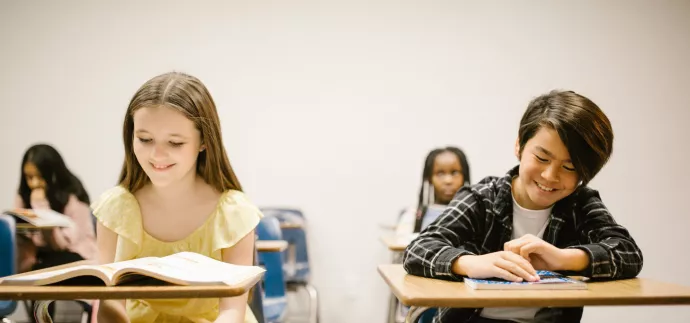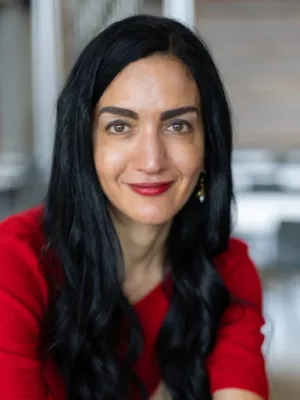
Kids, kindness, and collaboration
U of T Mississauga Psychology prof, a renowned expert in children’s mental health for the past two decades, expounds the value of community-based research

Her work has taken her around the world and spanning many diverse aspects of mental health in children and adolescents, but for Tina Malti the roots of her research remain grounded in two straightforward foundational principles: an enduring passion, as well as her family ties, for the subject matter.
“I've always been extremely fascinated by children's minds and inner worlds, and realizing that there's more going on than one would think,” says Malti in a recent interview on VIEW to the U podcast.
“I've also been inspired by my father, who really loved children, and was very supportive and nurturing himself. And he made me discover the beauty of the possibilities of a child's mind in many ways – that’s what really sticks out for me, when I think about how I became a child psychologist.”
Malti, a professor in the Department of Psychology at UTM, is the director of the Center for Child Development, Mental Health and Policy (CCDMP), established in 2019, and the founding director of the laboratory for Social-Emotional Development and Intervention (SEDI), which seeks to explore the roots and ramifications of kindness and aggression in children; SEDI has been around since 2010, the same year Malti joined the faculty at UTM.
A registered psychotherapist and clinical psychologist, she holds the Alexander von Humboldt Professorship of Early Child Development and Health at Leipzig University, where Malti leads the Humboldt Research Group for Child Development.
The work with the Humboldt Group is focused on better understanding how children’s trauma and traumatic childhood experiences can affect their mental health and development.
“There are different levels of trauma, for example, interpersonal trauma or abuse in the family context, but also trauma at the environmental level, including exposure to war or forest migration,” says Malti.
“What do we need to do? Specifically, possibly, for each of those experiences or combinations of experiences, to nurture every child in the best possible way. So, it's really a transformatory line of work that is based on my previous work, but also extends and transforms it, because now we really want to systematically look into the different layers of experience a child might have across the first two decades of life, and how that translates into healthy trajectories and different levels of needs and strength in children.”
This aligns completely with Malti’s overarching goal: to promote mental health in children and adolescents and ultimately inform public health frameworks to nurture positive development in children facing different levels of adversity.
The other important aspect to her work is the focus on community-based research and learning.
Malti says that community members are involved from the outset of a project so they help to drive the most significant related issues for them and inform how to most effectively conduct the research within that community so they are truly represented.
“I think that it’s very empowering for community members, and it’s a humbling experience for the researchers,” says Malti.
“I also feel it's beneficial for all involved stakeholders because the research is, on the one hand, shaped by the community's needs and priorities and expectations. At the same time, the researchers also have a say in how to do this kind of work. This reciprocal relationship typically helps create more sustainable impact and I’ve found that participants are extremely generous and want to contribute, and are also very grateful for being included in the university environment.”
Though Malti was trained by more traditional scientists, her own experiences helped her develop a community-based approach to her work and shaped her personally.
She has now worked with many diverse communities around the world and in the GTA, including projects with Syrian refugees and people from the Black community in the Peel Region. Her team has also devised a needs assessment to determine what children and caregivers require for various issues in their everyday lives, and it has illuminated certain deficiencies, such as better health services.
“I think, through these experiences, I learned the beauty and the benefits of this kind of work, and it transformed me as a researcher and as a person,” says Malti.
“I just discovered this is now who we've become through our participants and through those collaborative initiatives, and this work also helped us understand what it means to be more inclusive in our research design and move toward more inclusiveness in research.”
Resources
- Hear the full interview with Tina Malti on VIEW to the U
- Visit Tina Malti’s website
- See the CCDMP and SEDI lab websites also for more information on her work
- Also see the article from UTM News, “UTM psychology professor wants to uncover the roots of child empathy”
